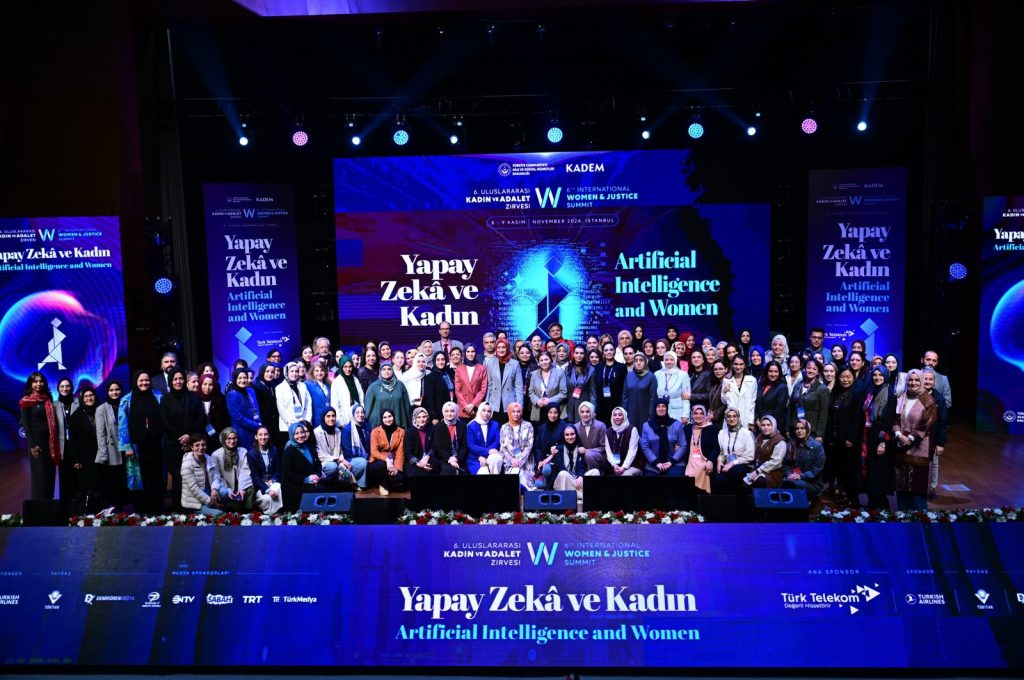The 6th International Women and Justice Summit, organized by the Women and Democracy Association (KADEM), convened global leaders, policymakers and experts to explore the intersection of artificial intelligence and gender justice. Held under the theme “Artificial Intelligence and Women,” the summit took place over two days, from Nov. 8-9, at Haliç University in Istanbul.
The opening ceremony on Nov. 8 featured the participation of President Recep Tayyip Erdoğan, first lady Emine Erdoğan and Family and Social Services Minister Mahinur Özdemir Göktaş, alongside various state officials. The event brought together local and international speakers, including leading experts, academics and researchers, to discuss the transformative potential of AI in advancing women’s rights and opportunities, as well as the challenges posed by gender biases embedded in technology.
Over the course of the summit, participants, including academics, experts and researchers from across the globe, gathered to discuss a range of critical topics under the main theme “Artificial Intelligence and Women.” The discussions centered on how AI can serve as a tool for gender equality or, alternatively, perpetuate existing hierarchies and inequalities. The outcomes of these discussions were published in a comprehensive final statement, which highlighted seven key recommendations aimed at addressing gender imbalances in AI technologies.
Seven key recommendations for AI gender equality
The final statement, presented by KADEM Advocacy and Research Department Director Dr. Betül Özel Çicek and KADEM Academic Advisory Board Member Dr. Ravza Altuntaş Çakır, emphasized the need for concrete actions to integrate gender equality into AI development. The seven proposals that emerged from the summit are as follows:
It is essential for decision-makers to prioritize the allocation of specific funds toward gender-sensitive AI initiatives. Efforts should be focused on the collection of data concerning women’s issues and increasing awareness, ensuring that AI technologies are harnessed in ways that positively impact women. National digital policies must incorporate comprehensive strategies that actively support girls and women in the digital economy, working toward their full inclusion and participation.
AI holds the promise of empowering women, but this potential can only be realized through dedicated action. It is necessary for policies to be developed that prevent AI systems from perpetuating existing gender hierarchies and inequalities. It is crucial to implement decisive measures that work toward closing the gender equality gap, ensuring that AI technologies are used to advance fairness and equality for all genders.
To promote fairness and inclusivity in AI, concerted efforts must be made to identify and eliminate discriminatory biases and stereotypes embedded in AI systems. Proactive measures should be implemented to prevent technologies from reinforcing or amplifying societal biases. Such actions are essential in creating AI systems that are equitable and accessible to all, promoting a more just society.
Encouraging female entrepreneurship and leadership within the AI field is paramount. Policies should create supportive, harassment-free environments and foster inclusive investments, which will enhance the presence of women in AI and enable them to make valuable contributions to the field. This will not only benefit the technology itself but will enrich the field with diverse perspectives, fostering innovation and creativity.
Gender justice must be prioritized in AI research, both in academic and industry settings. Efforts to increase the representation of women in AI research should be supported, along with initiatives aimed at establishing inclusive and equitable research practices. It is vital to ensure that women have equal opportunities to contribute to and shape the future of AI research.
A universally accepted best practices guide should be developed, one that promotes the active participation of girls, women and other underrepresented groups in all stages of AI development and application. Such a guide would serve as an essential tool for fostering inclusivity, equality and the adoption of best practices, ensuring that all voices are heard and represented in AI advancements.
Finally, it is crucial that AI governance frameworks be based on ethical and democratic principles. Policies should be designed to prevent biases from infiltrating the decision-making processes that shape AI regulations. A lack of representation in these processes risks overlooking the needs and perspectives of marginalized groups, particularly women. AI policies must be transparent, accountable and inclusive, ensuring that AI technologies serve the needs of all societal groups, with a particular focus on protecting women’s rights.


